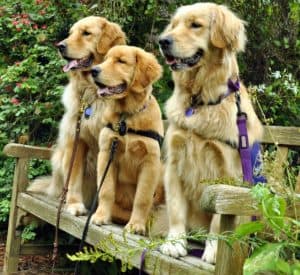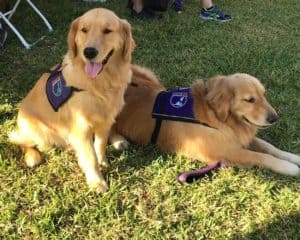Assistance Dogs: The Different Types of Service They Provide
 At Genesis Assistance Dogs, Inc. we believe that being an educational resource for our community is an important component of what we do. Whenever you see one our dogs around town either with one of our clients, or any of our puppy raisers accompanied by a puppy in training, you are seeing a Mobility Assistance Dog in action. Genesis only trains mobility assistance dogs for our clients. It’s our hope that as you read this blog: Assistance Dogs: The Different Types of Service They Provide you will be able to distinguish the different types of assistance dogs and the variety of services they can provide to their human companions. We hope that these distinctions will help you to identify the type of dog that would best support either you or a loved one.
At Genesis Assistance Dogs, Inc. we believe that being an educational resource for our community is an important component of what we do. Whenever you see one our dogs around town either with one of our clients, or any of our puppy raisers accompanied by a puppy in training, you are seeing a Mobility Assistance Dog in action. Genesis only trains mobility assistance dogs for our clients. It’s our hope that as you read this blog: Assistance Dogs: The Different Types of Service They Provide you will be able to distinguish the different types of assistance dogs and the variety of services they can provide to their human companions. We hope that these distinctions will help you to identify the type of dog that would best support either you or a loved one.
Medical Alert Dogs – These dogs are specifically trained to detect an oncoming seizure, an epileptic episode, identify changes in blood sugar levels, even sense a cardiac issue in their human counterpart. Medical Alert Dogs are not only trained to detect the onset of these types of medical crises, but they are skilled in obtaining assistance from a bystander or family member and can locate and retrieve a cellphone. Medical alert dogs are never far away from their partners.
Psychiatric Assistance Dogs are those that are trained to provide support to individuals who suffer from mental disabilities. They are taught to stop or prevent self-harm behavior, guide their humans through panic attacks (or stop them before they start), and detect other unacceptable behaviors. These dogs never leave their partners side unless he/she directs them to. They are considered medical assistance dogs.
Sight Dogs (Guide Dogs) provide navigational assistance for their companion. They are highly trained to stop when changes in elevation (curbs, steps etc.) occur, when overhead obstacles appear and to “stop” when given a command they believe is unsafe for their human. Once referred to as “seeing-eye dogs” they provide significant assistance to the visually impaired and legally blind individuals.
Hearing Dogs are assistance dogs who are trained to alert when sounds occur that their handler cannot hear. These dogs alert their handlers to alarms, ringing telephones, door bells, etc. Many public buildings, such as schools and hotels, utilize flashing light alarms along with audible fire alarms and hearing assistance dogs are proficient in identifying these alarms and warning their humans.
Mobility Assistance Dogs – Larger breeds are usually the perfect match for this type of service dog as they are trained to walk alongside their human teammates. Some wear a customized harness to provide additional support and stability. Depending on the needs of their partners these dogs can also be trained to provide assistance with wheelchair movement. Mobility Assistance Dogs are also trained to push automatic door openers, turn on/off light switches, close doors, open doors (including pantry, refrigerator and closets), etc.; basically, anything that can assist the person who has difficulty with movements that most of us take for granted.
Therapy Dogs or Facility Dogs are also not covered by the provisions of the ADA They are frequently pets who have been trained to give attention and provide comfort to people in the hospital, nursing homes, hospice facilities, doctor’s offices and schools. These are wonderful animals fulfilling a great need in our community; but they should not be confused with Assistance Dogs providing customized service to an individual with a disability.
Emotional Support Dogs are also not covered under the auspices of the ADA. These dogs are typically family pets who may or may not be trained to help their owners cope with the stresses of everyday life. While they provide a type of service to their owners, they are not considered to be assistance dogs.
If you believe a Mobility Assistance Dog will best suit your needs or the needs of a loved one, please feel free to visit our About Us page and see what sets Genesis Assistance Dogs, Inc. ahead of the pack.

